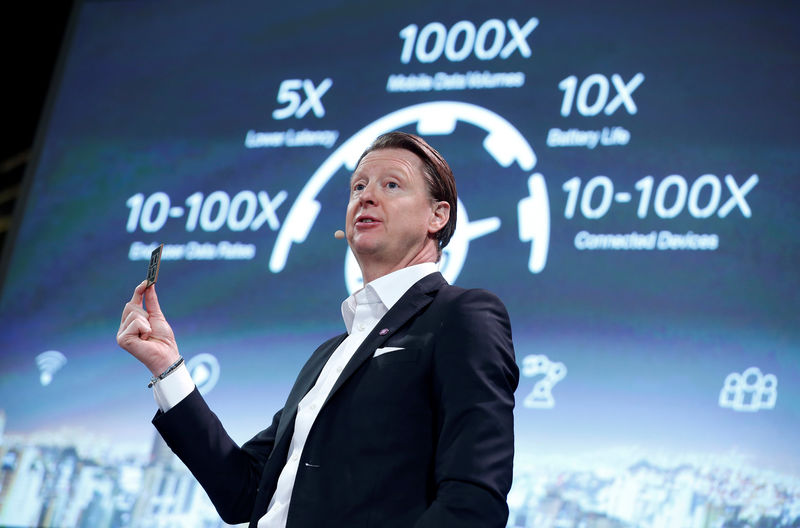By Sven Nordenstam
STOCKHOLM (Reuters) - Swedish mobile telecoms gear maker Ericsson (ST:ERICb) jettisoned its chief executive Hans Vestberg on Monday after pressure from major shareholders unhappy with its results.
Investment companies Investor AB (ST:INVEb) and Industrivarden (ST:INDUa), with a combined 37 percent of voting rights, had voiced dissatisfaction with Ericsson's performance, culminating in unprecedented public criticism in February.
Ericsson, which is battling Finland's Nokia and China's Huawei, has responded to weak industry demand by slashing jobs and accelerating cost cuts.
But despite this, Ericsson fell short of analyst forecasts for the fourth quarter in a row last week and Vestberg's leadership and pay have come under close scrutiny.
Ericsson chairman Leif Johansson said the search for a new CEO, which would consider both internal and external candidates, would take "many months", with Swedish media tipping Anders Runevad, a former long-time Ericsson executive and chief of Danish wind turbine maker Vestas, as a top candidate.
"If we can, we would like to find someone who has (a) good technology background, and of course the more proven that person is in terms of leadership, the better," Johansson said at a press conference following news of Vestberg's departure.
Shares in Ericsson, which has also faced a U.S. investigation into its anti-corruption programme, rose by 1.5 percent on Monday, having lost 21 percent so far this year.
"Clearly the company doesn't have a quick fix or back up plan given the search for a new CEO is just starting, but the removal of the CEO we thought would be taken well by the market as a positive first step." Neil Campling, Head of TMT Research for Northern Trust Capital Markets, said in a note.
Vestberg, who has been CEO since 2010, is leaving the company immediately and speculation about his replacement is seen as potentially destabilising for other firms.
"As a Vestas investor you'd have reason for concern that Runevad would have a hard time turning down an offer from Ericsson," said Sydbank analyst Jacob Pedersen.
Unlike the deep restructuring in past years at recently merged rivals Nokia (HE:NOKIA) and Alcatel-Lucent (PA:ALUA), Ericsson's cost cuts have been gradual, with additional measures announced in the two past quarterly reports on top of a big cost cutting programme in place since 2014.
Weak results in April knocked 15 percent off the shares in a single day and its most recent results revealed like-for-like sales declined for a seventh consecutive quarter.
BUYING IN VAIN
Under Vestberg, Ericsson acquired companies for some 28 billion crowns (£2.4 billion) to boost its position in more promising fields than its mainstay mobile base stations, such as business software for telecom operators and media clients, but these acquisitions have yet to show tangible returns.
Vestberg also oversaw the divestment of Ericsson's stake in handset maker Sony Ericsson.
While Nokia bought Alcatel to boost its position in the faster growing area of fixed line communications, Ericsson's strategy of mostly in-house growth proved insufficient, as it last year turned to network gear maker Cisco for a partnership after years of failure to gain traction on its own.
While Ericsson's performance was slipping, Vestberg faced criticism in the media for his use of a corporate jet and for taking on the role as chair of Sweden's Olympic Committee (SOC).
Meanwhile, shareholder Industrivarden was becoming more activist, with Ericsson the fifth Swedish bluechip company in which it has a stake to change its chief since early last year.
Ericsson's shares have fallen 47 percent from a peak last April, while Nokia's are down 31 percent. However, since Vestberg took the helm, Ericsson's shares have fared better than those of its Finnish rival.
Analysts said sharper cost cutting and acquisitions could now be on the cards, but they saw no easy fix.
"For most of the past seven years the strategy of the management has been to focus mainly on revenue growth as a method of improving profitability, but this has not paid off," analysts at Liberum said.
"We believe the solution lies is an aggressive slashing of costs, even if some revenue is lost in the process."

Chief Financial Officer Jan Frykhammar was named as Ericsson's acting chief executive, but does not want to permanently take on the role, Ericsson said.